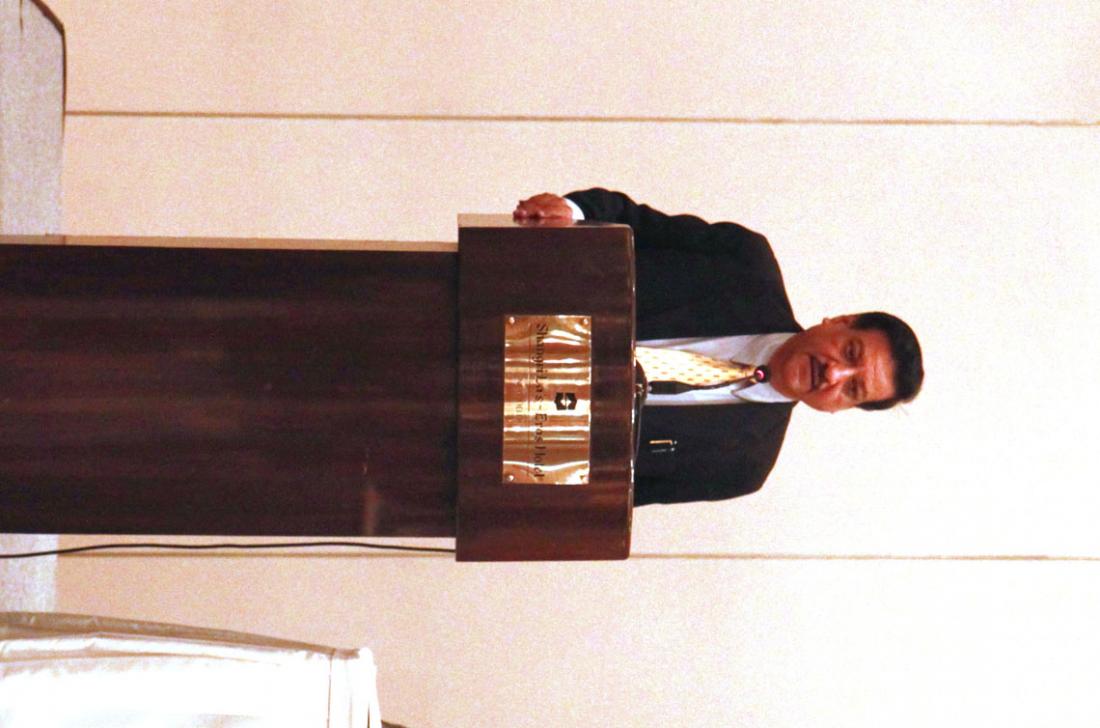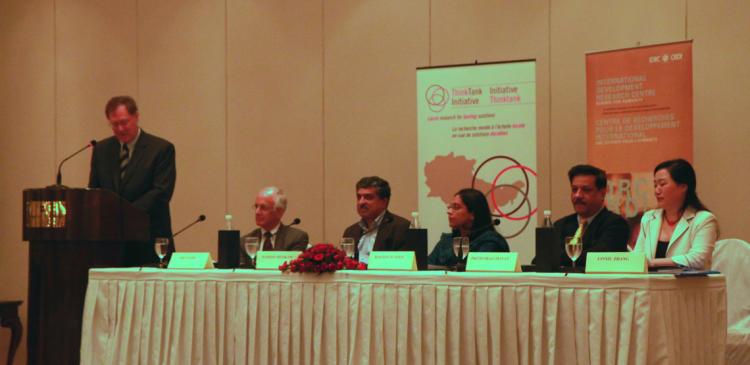Hon. Minister Prithviraj Chavan, Minister of State (Independent Charge) Science & Technology
Press Release: South Asian Think Tanks Receive Rare Boost: Long-term Core Funding
New Delhi, India, October 31, 2010: The Think Tank Initiative (TTI), a partnership of major donors, has awarded 21 Million USD in grants to 16 independent policy research institutions in South Asia. The long-term funding will help strengthen the think tanks’ role as influential players in national policymaking in the region. According to Hon. Minister Prithviraj Chavan, Minister of State (Independent Charge) Science & Technology, this kind of support is long overdue in India.
“While a lot of exciting things are happening with science and technology in India, almost nothing is happening in social science research and the creation of more high quality policy research organizations,” said the Minister. “So I must compliment the Think Tank Initiative for selecting these sixteen organizations and (helping) to increase their ability to deliver.”
The Minister was speaking at a panel discussion held to mark the launch of the Think Tank Initiative in South Asia. The event took place on Saturday, October 30 at the Shangri-La Hotel in New Delhi and featured several prominent speakers: Rukmini Banerji, Program Director, Pratham;, Nandan Nilekani, Chairman, Unique Identification Authority of India; Arun Maira, Member, Planning Commission; and Zhang Linxiu, Professor and Deputy Director, Center for Chinese Agricultural Policy, Chinese Academy of Sciences. They reflected on innovations and challenges in the South Asia policy research environment and engaged with an audience that included members of the research, donor, media, and policy-maker community in Delhi and representatives of the 16 institutions that are part of the South Asia Think Tank Initiative.
The Think Tank Initiative is a multi-donor program dedicated to strengthening independent policy research institutions in the developing world. Managed by Canada’s International Development Research Centre (IDRC), it is a partnership between IDRC, the William and Flora Hewlett Foundation, Bill & Melinda Gates Foundation, the UK Department for International Development and the Netherlands Directorate General for International Cooperation. The Initiative supports 52 think tanks in 23 countries in South Asia, Latin America and sub-Saharan Africa with a total investment of $65 Million USD.
The 16 think tanks from Bangladesh, Nepal, India, Pakistan and Sri Lanka were formally acknowledged at a launch ceremony on Saturday. Stephen McGurk, IDRC’s Regional Director based in Delhi, Sir Richard Stagg, British High Commissioner to India and Stewart Beck, the Canadian High Commissioner-Designate to India each made welcoming remarks at the event.
“IDRC’s research suggests there is a strong role for efforts like the TTI in South Asia” said McGurk. “Policies are not well served by local knowledge or local capabilities. There is a great need for research on policy questions.”
Kim Hamilton, Deputy Director, Policy and Advocacy, Global Development of the Bill and Melinda Gates Foundation announced each of the think tanks to enthusiastic applause. See full list of the institutions below.
The Initiative provides predictable core funding to the think tanks, which no longer have to rely on short-term project grants and consultancy contracts to operate. This stable funding will help them to attract, retain and build local talent as well as develop an independent research program. They can also invest in outreach to ensure that research results are used in policy debates. In the panel discussion following the announcement, Arun Maira of the Planning Commission, noted this critical function. “Merely having good quality research and outputs is not sufficient to influence policy,” he said during the panel discussion, “there needs to be a connection between those who do and those who think to make change happen."
Zhang Linxiu also spoke of the importance of truly engaging with policy makers, seeing them as allies and not obstacles. Her own institution – the Center for Chinese Agricultural Policy – has had a significant impact at the policy level. For the last two years, the Centre and its small faculty of 15 have had more policy recommendations directly endorsed by senior Chinese leadership than any other institution in the Chinese Academy of Sciences. “We always collaborate with policymakers, even when we criticize them,” said Linxiu, “we are always looking for a better avenue where we can walk together.”
Nandan Nilekani mentioned several challenges for policy research institutions, including the difficulty of attracting top talent in a competitive environment. He also emphasized the need for think tanks to have a strategic vision and to maintain their independence from both government and the private sector, while encouraging the free flow of ideas.
He called the initiative a “seminal moment,” adding that the challenges the region will face in the next 40 years will “require a huge amount of strategic thinking and policy formulation. Never before has the role of think tanks been so vital in this process.”
To close the panel, moderator Rukmini Banerji urged the audience not to neglect the importance of improving the quality of education at lower levels. Otherwise, people will not be equipped to use the research produced by the think tanks. “There is no point in having answers if you don’t have questions,” she said. “We have to have a culture in which you ask questions and are encouraged to look for answers…so that young people become thinkers.”
The 16 institutions that were announced on Saturday are:
Bangladesh
Institute of Governance Studies (IGS)
Centre for Policy Dialogue (CPD)
Nepal
Institute for Social and Environmental Transition-Nepal (ISET-N)
India
Indian Institute of Dalit Studies (IIDS)
Public Affairs Centre (PAC)
Center for Study of Science, Technology and Policy (CSTEP)
Institute of Rural Management (IRMA)
Indian Institute of Dalit Studies (IIDS)
National Council of Applied Economic Research (NCAER)
Centre for Policy Research (CPR)
Centre for Budget and Governance Accountability (CBGA)
Institute of Economic Growth (IEG)
Centre for the Study of Developing Societies (CSDS)
Pakistan
Social Policy and Development Centre (SPDC)
Sustainable Development Policy Institute (SDPI)
Sri Lanka
Institute of Policy Studies of Sri Lanka (IPS)
Centre for Poverty Analysis (CEPA)
For more information about the Think Tank Initiative, visit www.idrc.ca/thinktank
About IDRC
Canada’s International Development Research Centre (IDRC) is one of the world’s leading institutions in the generation and application of new knowledge to meet the challenges of international development. For nearly 40 years, IDRC has worked in close collaboration with researchers from the developing world to build healthier, more equitable, and more prosperous societies. www.idrc.ca
For further details contact:
Prabha Sethuraman
IDRC New Delhi Office
Mobile: +91 98734 55466
Email: [email protected]




